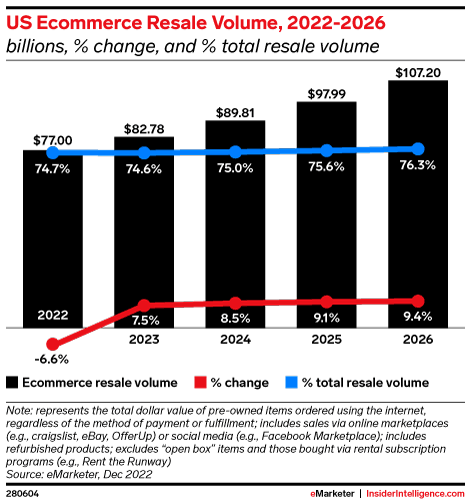Battling Resellers: Strategies for Dominating the eCommerce Landscape
The eCommerce landscape can be a battlefield, and one of the fiercest adversaries brands face is the reseller. Resellers typically buy products in bulk, often at discounted rates, and then resell them at a markup on various online platforms. While reselling can be a legitimate business model, it poses significant challenges for brands looking to maintain control over their pricing, brand image, and customer experience.
Understanding the Reseller Phenomenon
Reselling can be an attractive business opportunity for individuals seeking flexible income streams or entrepreneurs looking to capitalize on market demand for popular products. Resale volume in the United States grew by about 7.5% in 2023, and is expected to grow to $107.2 billion by 2026, as can be seen in the graph to the right. Resellers often leverage arbitrage opportunities, exploiting price differentials between various online platforms or geographic regions to turn a profit. Additionally, some resellers specialize in acquiring limited edition or hard-to-find items, creating scarcity and driving up prices in the secondary market. While resellers may provide consumers with access to a broader range of products, their presence can dilute brand value, erode profit margins, and undermine brand control.
How Do Resellers Impact Brands?
Resellers can have a profound impact on brands' eCommerce strategies, disrupting pricing dynamics, cannibalizing sales, and tarnishing brand reputation. eCommerce brands should approach resellers with caution due to several potential pitfalls.
Firstly, resellers often engage in price competition, undercutting official brand prices and diminishing product value, leading to reduced profit margins. Additionally, resellers may not uphold the brand's standards for customer service or product quality, tarnishing the brand's reputation and eroding consumer trust.
Moreover, selling through unauthorized channels can result in a loss of control over distribution channels, pricing strategies, and brand messaging, causing conflicts and inconsistencies in the customer experience.
Furthermore, resellers may engage in illegal activities such as selling counterfeit goods or engaging in fraudulent transactions, posing legal and regulatory risks for the brand. Customer confusion may arise from multiple sellers offering the same products on different platforms, impacting sales and credibility. Lastly, products sold by unauthorized resellers may not be eligible for manufacturer warranties or after-sales support, leading to customer frustration and negative word-of-mouth.
To mitigate these risks, eCommerce brands must remain vigilant in monitoring and managing their distribution channels, pricing policies, and brand reputation.
Strategies for Battling Resellers
- Implement Minimum Advertised Price (MAP) Policies:
-
- MAP policies set a floor price that resellers must adhere to when advertising a brand's products, preventing them from engaging in price wars or undercutting authorized retailers. By enforcing MAP policies, brands can maintain price integrity, protect profit margins, and preserve brand value. Additionally, brands should monitor online marketplaces and enforce compliance with MAP policies through regular audits and enforcement actions against violators.
- Leverage Channel Management Technology:
-
- Channel management technology can be a game-changer against resellers, enabling brands to monitor and manage their presence across multiple eCommerce platforms. Advanced analytics tools can track pricing trends, identify unauthorized sellers, and detect violations of MAP policies in real-time. Brands can use channel management technology to enforce pricing guidelines, automate compliance monitoring, and optimize their distribution networks. By harnessing the power of technology, brands can gain visibility and control over their online presence, minimizing the impact of resellers and maximizing revenue opportunities.
- Strengthen Brand Protection Measures:
-
- In addition to proactive pricing and distribution strategies, brands should invest in robust brand protection measures to combat counterfeiting, trademark infringement, and unauthorized use of intellectual property. Trademark registration, copyright protection, and patent enforcement can provide legal safeguards against counterfeiters and unauthorized resellers. The global online brand protection software market has grown significantly over the last several years, and is forecasted to continue growing at a rate of approximately 15.24% per year until 2030. Brands should also implement anti-counterfeiting technologies such as holograms, RFID tags, and serial numbers to authenticate products and deter counterfeiters.
- Enhance Customer Engagement and Loyalty:
-
- In the battle against resellers, brands can leverage customer engagement and loyalty initiatives to fortify their defenses and cultivate a loyal customer base. By delivering exceptional customer experiences, personalized services, and value-added benefits, brands can differentiate themselves from resellers and build strong emotional connections with consumers. About 72% of global consumers are loyal to at least one brand. Developing customer loyalty can make or break your eCommerce brand. Loyalty programs, referral incentives, and exclusive offers can incentivize repeat purchases and foster brand advocacy. Brands should prioritize transparency, authenticity, and responsiveness in their interactions with customers, earning their trust and loyalty in the face of reseller competition.
- Monitor and Respond to Market Dynamics:
-
- To stay ahead of the competition and anticipate emerging threats from resellers, brands must continuously monitor market dynamics, consumer behavior, and competitive trends. Brands should analyze market data and adjust their eCommerce strategies accordingly, proactively addressing challenges posed by resellers and capitalizing on new opportunities for growth. By staying agile and adaptive, brands can maintain their competitive edge and thrive.
Battling resellers across eCommerce marketplaces requires a multi-faceted approach that combines proactive pricing strategies, channel management tactics, brand protection measures, and customer engagement initiatives. In the relentless struggle for supremacy in the eCommerce arena, brands must remain vigilant, adaptable, and customer-centric to emerge victorious in the battle against resellers.
More About aiCommerce
aiCommerce is a global digital marketing agency with a focus on retail and eCommerce marketplaces. aiCommerce can help your brand grow across eCommerce channels to gain brand awareness, visibility, and increase sales, all backed by our 90-day guarantee. Now is the perfect time to utilize our eCommerce experts to help grow your business. Click the button below to qualify for a free listing audit to jumpstart your eCommerce growth!




